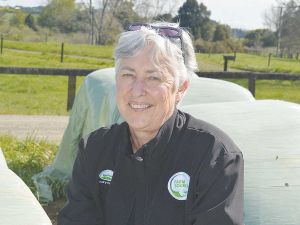Battle for milk
OPINION: Fonterra may be on the verge of selling its consumer business in New Zealand, but the co-operative is not keen on giving any ground to its competitors in the country.
 Fonterra board candidate Annabel Cotton says the co-op must assure shareholders that it is back on path.
Fonterra board candidate Annabel Cotton says the co-op must assure shareholders that it is back on path.
Waikato-based financial consultant and Fonterra board aspirant Annabel Cotton believes this is a critical time for the co-op to get back on path.
Cotton, who owns a 252ha farm west of Hamilton with her husband and brother, is one of the six candidates vying to get on the co-operative board.
Cotton told Dairy News that it feels like she’s been “training for this my whole career”.
“This is a critical time for Fonterra to assure us it is back on path,” she says.
“It needs serious grade financial and analytical skills, proper risk assessment and strong sets of financial and non-financial metrics to monitor strategy implementation and measure asset performance. You really need to understand how big business models work and that different, value based outcomes are going to be delivered.”
Cotton says she has talked to some of NZ’s leading public relations reputation and crisis thinkers.
“I think more open financial market communications is a critical element that’s been missing, and the need to build confidence for investors.”
Cotton says Fonterra’s good performance over the last two years has been a relief.
In her work, she meets board chairs and chief executives and they tell her that Fonterra has the right combination to get the business back on track.
She notes that the 2020 financial year performance was good.
“Ten years of bad performance has been addressed, so close to a 10 for performance.
“The debt level is okay but we still have some non-core assets and there are still some big decisions to be led from the top on which products milk will be allocated to.
“A 3-5 year turnaround is okay from a position where people were telling me Fonterra was on a knife edge: 2021 is the start of the end of that time frame.”
On the dairy industry, Cotton is very positive and optimistic.
However, she says entry provisions for new farmers are a worry.
“For example, new farmers coming in, being able to sell shares if we’ve hit peak milk production – who do you sell them to?”
Cotton, who consults on capital markets communications and corporate governance, says Fonterra must engage on this and strengthen its reputation.
Cotton comes from a family well connected to the dairy industry.
Her great grandfather, Thomas Blackett, was chair of the New Zealand Dairy Association and drove the merger in 1919 that created the New Zealand Cooperative Dairy Company, enabling supply to remain farmer-controlled.
Some parts of the family farm have been in the family for over 100 years; one of the very few dairy properties in NZ to have never changed hands.
Cotton has held governance appointments at a range of large New Zealand companies across a range of industries, including chairing the audit and risk committees for many of these companies.
Her current appointments include directorships of NZX Regulation, Waikato Regional Airport and a fund manager, Trust Investments Management.
Cotton’s consultancy business advises NZX and ASX listed boards and executives on governance and communication of value and operational and financial performance.
She is a Fellow of the Institute of Directors, Chartered Accountants Australia & NZ, Institute of Finance Professionals and Australasian Investor Relations Association.
Early forecasts for New Zealand's apples and pears point to a standout season marked by exceptional fruit quality and high pack-out rates.
Tickets are now available for Beef + Lamb New Zealand’s (B+LNZ) Out the Gate, returning from 19-21 May 2026 at Te Pae, Christchurch.
Dairy Women's Network (DWN) is welcoming AgriHealth as a new partner.
Northland Field Days patron Ross Newlove remembers the inaugural field days he attended 40 years ago.
Southland farmer Murray Donald has been appointed as chair of Safer Farms, the industry-led organisation focused on reducing harm, injuries and fatalities in the agricultural sector.
National Lamb Day returns this Sunday, 15 February, with Beef + Lamb New Zealand Inc calling on Kiwis to fire up their barbecues and celebrate the people and the product that put New Zealand on the world map.
OPINION: Fonterra may be on the verge of selling its consumer business in New Zealand, but the co-operative is not…
OPINION: What does the birth rate in China have to do with stock trading? Just ask a2 Milk Company.